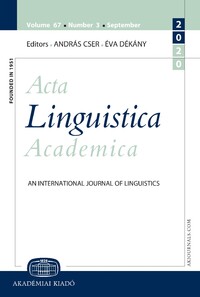On the internal structure of Serbian -(n)je nominalizations
On the internal structure of Serbian -(n)je nominalizations
Author(s): Predrag KovačevićSubject(s): Lexis
Published by: Akadémiai Kiadó
Keywords: nominalizations; passive participles; event-related modifiers; aspect; lexicalization
Summary/Abstract: The paper deals with the internal syntactic structure of deverbal -nje nominals in Serbian. The tests from the licensing of event-related modifiers (by-phrases and instrumental DPs) support the hypothesis that -nje nominals are derived from passive participles by adding the suffix -je (Marvin 2002; Simonović & Arsenijević 2014). Building on Simonović & Arsenijević (2014), I further observe that the licensing of referential and non-referential event modifiers exhibits a complex set of correlations with the aspectual properties of the base, phonological faithfulness to the base, and semantic compositionality. Semantic opacity and phonological unfaithfulness do not always go hand in hand, and I treat them as two separate components of a process of lexicalization, which is syntactically constrained (Marantz 1997). I argue that the presence of full VoiceP structure including a v 0 referring to an event diagnosed by the licensing of referential event modifiers (Alexiadou et al. 2014) constitutes a phase, which blocks lexicalization. This structure is present in -nje nominals derived from secondary imperfectives, which always license referential event modifiers and exhibit semantic compositionality and phonological unfaithfulness. Smaller structures derived from perfectives or primary imperfectives do not license referential event modifiers (hence, they do not constitute a full phase), which is what makes them susceptible to lexicalization.
- Issue Year: 68/2021
- Issue No: 4
- Page Range: 426-453
- Page Count: 28
- Language: English

